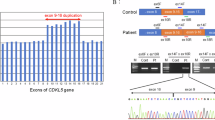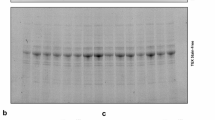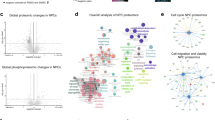Abstract
We report the identification of a novel exon, which is referred to as exon 16b, within the cyclin-dependent kinase (CDK)-like 5 (CDKL5) gene that is implicated in the X-linked infantile spasm syndrome and the early-onset seizure variant of Rett syndrome. Interestingly, it is highly conserved in species through evolution, suggesting a potential functional role, but does not display any homology with other referenced sequences. Most importantly, the transcript including this exon is specifically expressed in brain. We suggest that CDKL5 exon 16b should now be considered in the genetic screening of patients presenting with a CDKL5-related disease profile.
Similar content being viewed by others
Log in or create a free account to read this content
Gain free access to this article, as well as selected content from this journal and more on nature.com
or
References
Montini, E., Andolfi, G., Caruso, A., Buchner, G., Walpole, S. M., Mariani, M. et al. Identification and characterization of a novel serine-threonine kinase gene from the Xp22 region. Genomics 51, 427–433 (1998).
Kalscheuer, V. M., Tao, J., Donnelly, A., Hollway, G., Schwinger, E., Kübart, S. et al. Disruption of the serine/threonine kinase 9 gene causes severe X-linked infantile spasms and mental retardation. Am. J. Hum. Genet. 72, 1401–1411 (2003).
Weaving, L. S., Christodoulou, J., Williamson, S. L., Friend, K. L., McKenzie, O. L., Archer, H. et al. Mutations of CDKL5 cause a severe neurodevelopmental disorder with infantile spasms and mental retardation. Am. J. Hum. Genet. 75, 1079–1093 (2004).
Tao, J., Van Esch, H., Hagedorn-Greiwe, M., Hoffmann, K., Moser, B., Raynaud, M. et al. Mutations in the X-linked cyclin-dependent kinase-like 5 (CDKL5/STK9) gene are associated with severe neurodevelopmental retardation. Am. J. Hum. Genet. 75, 1149–1154 (2004).
Evans, J. C., Archer, H. L., Colley, J. P., Ravn, K., Nielsen, J. B., Kerr, A. et al. Early onset seizures and Rett-like features associated with mutations in CDKL5. Eur. J. Hum. Genet. 13, 1113–1120 (2005).
Lin, C., Franco, B. & Rosner, M. R. CDKL5/Stk9 kinase inactivation is associated with neuronal developmental disorders. Hum. Mol. Genet. 14, 3775–3786 (2005).
Scala, E., Ariani, F., Mari, F., Caselli, R., Pescucci, C., Longo, I. et al. CDKL5/STK9 is mutated in Rett syndrome variant with infantile spasms. J. Med. Genet. 42, 103–107 (2005).
Archer, H. L., Evans, J., Edwards, S., Colley, J., Newbury-Ecob, R., O'Callaghan, F. et al. CDKL5 mutations cause infantile spasms, early onset seizures, and severe mental retardation in female patients. J. Med. Genet. 43, 729–734 (2006).
Mari, F., Azimonti, S., Bertani, I., Bolognese, F., Colombo, E., Caselli, R. et al. CDKL5 belongs to the same molecular pathway of MeCP2 and it is responsible for the early-onset seizure variant of Rett syndrome. Hum. Mol. Genet. 14, 1935–1946 (2005).
Nectoux, J., Heron, D., Tallot, M., Chelly, J. & Bienvenu, T. Maternal origin of a novel C-terminal truncation mutation in CDKL5 causing a severe atypical form of Rett syndrome. Clin. Genet. 70, 29–33 (2006).
Van Esch, H., Jansen, A., Bauters, M., Froyen, G. & Fryns, J. P. Encephalopathy and bilateral cataract in a boy with an interstitial deletion of Xp22 comprising the CDKL5 and NHS genes. Am. J. Med. Genet. A 143A, 364–369 (2007).
Rosas-Vargas, H., Bahi-Buisson, N., Philippe, C., Nectoux, J., Girard, B., N'Guyen Morel, M. A. et al. Impairment of CDKL5 nuclear localisation as a cause for severe infantile encephalopathy. J. Med. Genet. 45, 172–178 (2008).
Elia, M., Falco, M., Ferri, R., Spalletta, A., Bottitta, M., Calabrese, G. et al. CDKL5 mutations in boys with severe encephalopathy and early-onset intractable epilepsy. Neurology 71, 997–999 (2008).
Erez, A., Patel, A. J., Wang, X., Xia, Z., Bhatt, S. S., Craigen, W. et al. Alu-specific microhomology-mediated deletions in CDKL5 in females with early-onset seizure disorder. Neurogenetics 10, 363–369 (2009).
Fichou, Y., Bieth, E., Bahi-Buisson, N., Nectoux, J., Girard, B., Chelly, J. et al. Re: CDKL5 mutations in boys with severe encephalopathy and early-onset intractable epilepsy. Neurology 73, 77–78 (2009).
Sartori, S., Di Rosa, G., Polli, R., Bettella, E., Tricomi, G., Tortorella, G. et al. A novel CDKL5 mutation in a 47,XXY boy with the early-onset seizure variant of Rett syndrome. Am. J. Med. Genet. A 149A, 232–236 (2009).
Russo, S., Marchi, M., Cogliati, F., Bonati, M. T., Pintaudi, M., Veneselli, E. et al. Novel mutations in the CDKL5 gene, predicted effects and associated phenotypes. Neurogenetics 10, 241–250 (2009).
Sprovieri, T., Conforti, F. L., Fiumara, A., Mazzei, R., Ungaro, C., Citrigno, L. et al. A novel mutation in the X-linked cyclin-dependent kinase-like 5 (CDKL5) gene associated with a severe Rett phenotype. Am. J. Med. Genet. A 149A, 722–725 (2009).
Saletti, V., Canafoglia, L., Cambiaso, P., Russo, S., Marchi, M. & Riva, D. A CDKL5 mutated child with precocious puberty. Am. J. Med. Genet. A 149A, 1046–1051 (2009).
Bahi-Buisson, N., Girard, B., Gautier, A., Nectoux, J., Fichou, Y., Saillour, Y. et al. Epileptic encephalopathy in a girl with an interstitial deletion of Xp22 comprising promoter and exon 1 of the CDKL5 gene. Am. J. Med. Genet. B Neuropsychiatr. Genet. 153B, 202–207 (2010).
Psoni, S., Willems, P. J., Kanavakis, E., Mavrou, A., Frissyra, H., Traeger-Synodinos, J. et al. A novel p.Arg970X mutation in the last exon of the CDKL5 gene resulting in late-onset seizure disorder. Eur. J. Paediatr. Neurol. 14, 188–191 (2010).
Bahi-Buisson, N., Nectoux, J., Rosas-Vargas, H., Milh, M., Boddaert, N., Girard, B. et al. Key clinical features to identify girls with CDKL5 mutations. Brain 131, 2647–2661 (2008).
Rusconi, L., Salvatoni, L., Giudici, L., Bertani, I., Kilstrup-Nielsen, C., Broccoli, V. et al. CDKL5 expression is modulated during neuronal development and its subcellular distribution is tightly regulated by the C-terminal tail. J. Biol. Chem. 283, 30101–30111 (2008).
Amir, R. E., Van den Veyver, I. B., Wan, M., Tran, C. Q., Francke, U. & Zoghbi, H. I. Rett syndrome is caused by mutations in X-linked MECP2, encoding methyl-CpG-binding protein 2. Nat. Genet. 23, 185–188 (1999).
Bertani, I., Rusconi, L., Bolognese, F., Forlani, G., Conca, B., De Monte, L. et al. Functional consequences of mutations in CDKL5, an X-linked gene involved in infantile spasms and mental retardation. J. Biol. Chem. 281, 32048–32056 (2006).
Kameshita, I., Sekiguchi, M., Hamasaki, D., Sugiyama, Y., Hatano, N., Suetake, I. et al. Cyclin-dependent kinase-like 5 binds and phosphorylates DNA methyltransferase 1. Biochem. Biophys. Res. Commun. 377, 1162–1167 (2008).
Desmet, F. O., Hamroun, D., Lalande, M., Collod-Béroud, G., Claustres, M. & Béroud, C. Human Splicing Finder: an online bioinformatics tool to predict splicing signals. Nucleic Acids Res. 37, e67 (2009).
Kriaucionis, S. & Bird, A. The major form of MeCP2 has a novel N-terminus generated by alternative splicing. Nucleic Acids Res. 32, 1818–1823 (2004).
Mnatzakanian, G. N., Lohi, H., Munteanu, I., Alfred, S. E., Yamada, T., MacLeod, P. J. et al. (2004) A previously unidentified MECP2 open reading frame defines a new protein isoform relevant to Rett syndrome. Nat. Genet. 36, 339–341.
Ravn, K., Nielsen, J. B. & Schwartz, M. Mutations found within exon 1 of MECP2 in Danish patients with Rett syndrome. Clin. Genet. 67, 532–533 (2005).
Bartholdi, D., Klein, A., Weissert, M., Koenig, N., Baumer, A., Boltshauser, E. et al. Clinical profiles of four patients with Rett syndrome carrying a novel exon 1 mutation or genomic rearrangement in the MECP2 gene. Clin. Genet. 69, 319–326 (2006).
Chunshu, Y., Endoh, K., Soutome, M., Kawamura, R. & Kubota, T. A patient with classic Rett syndrome with a novel mutation in MECP2 exon 1. Clin. Genet. 70, 530–531 (2006).
Quenard, A., Yilmaz, S., Fontaine, H., Bienvenu, T., Moncla, A., des Portes, V. et al. Deleterious mutations in exon 1 of MECP2 in Rett syndrome. Eur. J. Med. Genet. 49, 313–322 (2006).
Fichou, Y., Nectoux, J., Bahi-Buisson, N., Rosas-Vargas, H., Girard, B., Chelly, J. et al. The first missense mutation causing Rett syndrome specifically affecting the MeCP2_e1 isoform. Neurogenetics 10, 127–133 (2009).
Saunders, C. J., Minassian, B. E., Chow, E. W., Zhao, W. & Vincent, J. B. Novel exon 1 mutations in MECP2 implicate isoform MeCP2_e1 in classical Rett syndrome. Am. J. Med. Genet. A 149A, 1019–1023 (2009).
Moore, J. D., Yang, J., Truant, R. & Kornbluth, S. Nuclear import of Cdk/cyclin complexes: identification of distinct mechanisms for import of Cdk2/cyclin E and Cdc2/cyclin B1. J. Cell. Biol. 144, 213–224 (1999).
Ericson, K. K., Krull, D., Slomiany, P. & Grossel, M. J. Expression of cyclin-dependent kinase 6, but not cyclin-dependent kinase 4, alters morphology of cultured mouse astrocytes. Mol. Cancer Res. 9, 654–664 (2003).
Acknowledgements
We thank Dr Evelyne Bloch-Gallego and Stéphanie Backer for their technical expertize in in situ hybridization, and Yoann Saillour for his technical assistance with the 7500 Real-Time PCR System. This work was supported by the Institut National de la Santé et de la Recherche Médicale (ANR E-RARE EuroRETT Network).
Author information
Authors and Affiliations
Corresponding author
Rights and permissions
About this article
Cite this article
Fichou, Y., Nectoux, J., Bahi-Buisson, N. et al. An isoform of the severe encephalopathy-related CDKL5 gene, including a novel exon with extremely high sequence conservation, is specifically expressed in brain. J Hum Genet 56, 52–57 (2011). https://doi.org/10.1038/jhg.2010.143
Received:
Revised:
Accepted:
Published:
Issue date:
DOI: https://doi.org/10.1038/jhg.2010.143
Keywords
This article is cited by
-
Altered network and rescue of human neurons derived from individuals with early-onset genetic epilepsy
Molecular Psychiatry (2021)
-
Mutations in the C-terminus of CDKL5: proceed with caution
European Journal of Human Genetics (2014)
-
A novel transcript of cyclin-dependent kinase-like 5 (CDKL5) has an alternative C-terminus and is the predominant transcript in brain
Human Genetics (2012)
-
Identification of a novel CDKL5 exon and pathogenic mutations in patients with severe mental retardation, early-onset seizures and Rett-like features
neurogenetics (2011)



